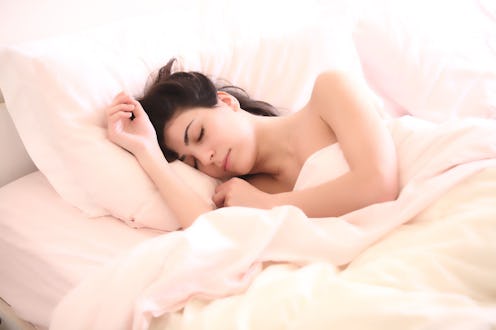Life
9 Signs You Have Sleep Apnea & May Not Realize It

If you're someone who is constantly tired, you may blame your diet, your busy schedule, or some weird illness, but it might actually be coming from something much more straightforward. If you're sleeping normal hours every night but not feeling rested, you may be exhibiting some signs you have sleep apnea and not even realize it. Sleep apnea is a common disorder in which you have one or more pauses in breathing or shallow breaths while you sleep, according to the National Institutes of Health. These breathing pauses can last from a few seconds to minutes, and they may occur 30 times or more an hour.
"The persistent awakenings to breath decreases sleep quality, which increases the drive for sleep in the daytime and at night," says Dr. Robert Oexman, Director of The Sleep to Live Institute, over email. "This causes the person suffering from sleep apnea to be chronically sleepy during the day."
There are two types of sleep apnea, central sleep apnea and obstructive sleep apnea. The former is less common and occurs when your brain does not signal the body to begin respiration, says Oexman. Obstructive sleep apnea is the most common, and unlike central sleep apnea, your brain makes an effort to breath, but the air passage has collapsed due to a decrease in muscle tone as you sleep, especially during REM sleep.
It's not always obvious when you have sleep apnea and it can often go undiagnosed, so it can be useful to notice any subtle symptoms you have the disorder. If you recognize any of these signs, it's best to see a doctor who can give you a proper diagnose. Here are nine signs you might have sleep apnea and not even realize it.
1You Have Urges To Pee At Night
Sleep apnea can cause an urgent need to urinate, and it can sometimes even lead to accidents in the night. "To open the airway to begin breathing, patients suffering from sleep apnea will use a great deal of abdominal muscle and diaphragm effort," says Oexman. "This effort puts a great deal of pressure on the abdomen, and thus the bladder. If the patient wakes up, they will sense the pressure as the need to urinate. In some cases, the patient can urinate without the ability to stop the flow while still in bed."
2You Have A Headache When You Wake Up
"Due to the low levels of oxygen that occur during sleep apnea, patients can complain about headaches when they awaken," says Oexman. "Also, the amount of muscle effort used to open the airway can put strain on the neck, muscles causing headaches." It also doesn't help that you're not getting a full restful sleep, which could lead to feelings of tiredness and head pains.
3You Always Feel Sleepy
You might find that you have a hard time staying awake during the day and fall asleep at inopportune moments. "Daytime sleepiness is one of the most common complaints of people eventually diagnosed with sleep apnea," says Dr. Teofilo Lee-Chiong, Chief Medical Liaison, Philips, over email. "Restless nights cause fatigue and sleepiness all day, and if you consistently feel this way (and no amount of coffee seems to help), it could be time to be tested for sleep apnea."
4You Snore Or Gasp For Air
Snoring and gasping for air are common red flags of sleep apnea. "Although some say that snoring is a sign of 'deep sleep,' it is not normal to snore and experience pauses in breathing, or to choke or gasp for air at night," says Dr. Alon Avidan, MD, MPH, Director of the UCLA Sleep Disorders Center at the David Geffen School of Medicine at UCLA Health, over email. "These signs point to a high likelihood of obstructive sleep apnea."
5You Can't Concentrate
Poor concentration and memory during the day may also point toward untreated sleep apnea. "Untreated sleep apnea leads to non-restorative, poor-quality sleep, due to the multiple awakenings at night," says Avidan. "Additional research suggests that the chronic oxygen loss due to the sleep apnea changes the architecture of the brain, leading to structural changes in the brain impacting memory and mood."
6You Feel Depressed
"Many studies have shown that people with sleep apnea are more likely to have mood disorders, particularly depression," says Jocelyn Cheng, MD, neurologist at NYU Langone Health, over email. One study from the Journal of Research in Medical Sciences found that about 46 percent of people with obstructive sleep apnea had depressive symptoms while 54 percent people with the disorder experienced anxiety.
7You're Noticing Weight Gain
Sleep apnea interferes with metabolism, and you may have noticed this if you have problems with losing weight, or more frustratingly, with gaining weight, despite diet and exercise. "Sleep apnea has been associated with impairing your body’s ability to process sugar, which also puts you at greater risk for type 2 diabetes," says Cheng.
8You Have A Low Sex Drive
If you have a low sex drive or problems in the bedroom and you're not sure why, it could be a result of sleep apnea. "Though not definitive, there may be an association between sleep apnea and sexual dysfunction in both men and women," says Cheng. "In men, this can present as erectile dysfunction. In women, symptoms may include decreases in sexual desire, orgasm, and satisfaction."
9You Experience Night Sweats
Do you find yourself having to consistently turn the thermostat down in your bedroom because you regularly feel hot or sweaty during the night? "If so, then you should get tested for sleep apnea," says sleep expert Dr. Joseph Krainin over email. "Sleep apnea can cause night sweats due to your body going into hyperdrive each time you stop breathing."